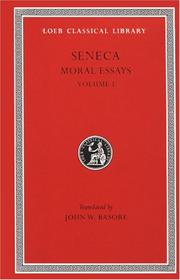| Listing 1 - 2 of 2 |
Sort by
|
Dissertation
Year: 1935 Publisher: Paris : Boivin,
Abstract | Keywords | Export | Availability | Bookmark
 Loading...
Loading...Choose an application
- Reference Manager
- EndNote
- RefWorks (Direct export to RefWorks)

ISBN: 0674992369 0674992806 0674993438 Year: 1935 Publisher: [Place of publication not identified] Harvard University Press
Abstract | Keywords | Export | Availability | Bookmark
 Loading...
Loading...Choose an application
- Reference Manager
- EndNote
- RefWorks (Direct export to RefWorks)
Seneca, Lucius Annaeus, born at Corduba (Cordova) ca. 4 BCE, of a prominent and wealthy family, spent an ailing childhood and youth at Rome in an aunt's care. He became famous in rhetoric, philosophy, money-making, and imperial service. After some disgrace during Claudius's reign he became tutor and then, in 54 CE, advising minister to Nero, some of whose worst misdeeds he did not prevent. Involved (innocently?) in a conspiracy, he killed himself by order in 65. Wealthy, he preached indifference to wealth; evader of pain and death, he preached scorn of both; and there were other contrasts between practice and principle. We have Seneca's philosophical or moral essays (ten of them traditionally called Dialogues)-on providence, steadfastness, the happy life, anger, leisure, tranquility, the brevity of life, gift-giving, forgiveness-and treatises on natural phenomena. Also extant are 124 epistles, in which he writes in a relaxed style about moral and ethical questions, relating them to personal experiences; a skit on the official deification of Claudius, Apocolocyntosis (in Loeb Classical Library no. 15); and nine rhetorical tragedies on ancient Greek themes. Many epistles and all his speeches are lost. The Loeb Classical Library edition of Seneca is in eleven volumes: his moral essays are collected in Volumes I-III; the 124 epistles in Volumes IV-VI; the tragedies in Volumes VIII and IX; and the treatises on natural phenomena, Naturales Quaestiones, in Volumes VII and X. Volume XI contains the short satirical pamphlet Apocolocyntosis (Pumpkinification).
| Listing 1 - 2 of 2 |
Sort by
|

 Search
Search Feedback
Feedback About
About Help
Help News
News